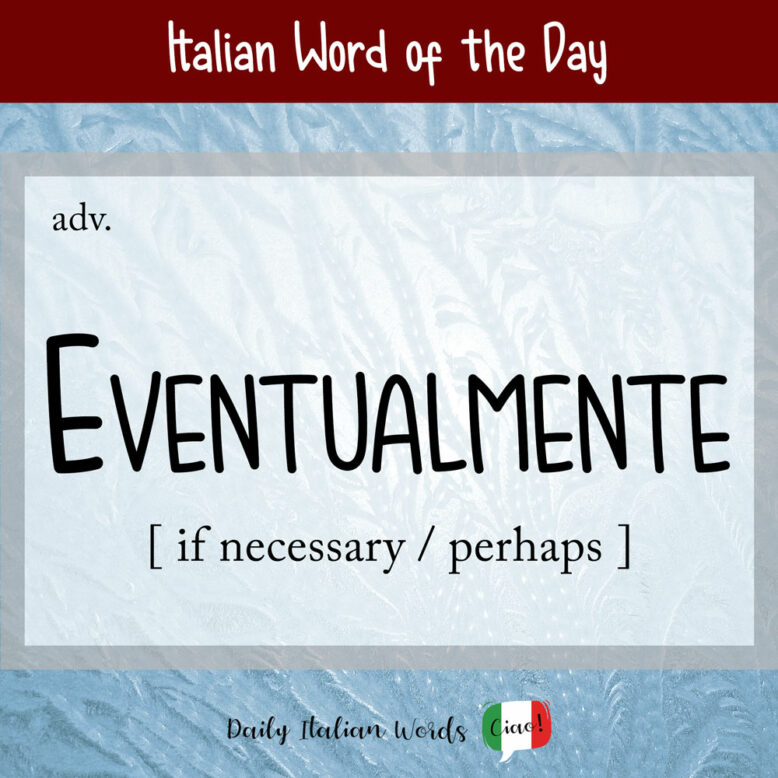In linguistics, false friends (or falsi amici in Italian) are words in different languages that look or sound similar, but differ in meaning. One of my favourite examples is the English eventually and the Italian eventualmente, the latter of which is our word of the day.

In English eventually is synonymous with the expressions prima o poi (sooner or later), alla fine (in the end) or uno di questi giorni (one of these days).
In Italian, eventualmente is another way of saying in the event that a certain situation or circumstance occurs. There are many possible translations in English, including:
- perhaps
- if necessary
- if need be
- in the event that
- should
- by any chance
- (just) in case
The English eventually implies the relative certainty of an action or an event, but you don’t know exactly when it will happen.
The Italian eventualmente implies uncertainty of an action or an event, in that it may or may not happen. Let’s look at two examples:
Verrò a trovarti prima o poi.
I’ll come and visit you eventually.
(There is relative certainty that I’ll visit the person. I’m not just sure when.)
Eventualmente verrò a trovarti.
Perhaps I’ll come and visit you.
(I’m not sure if I’ll visit the person or not.)
The truth is that eventualmente is not a word that can be easily encompassed in a simple explanation. If we look at the examples above, I used perhaps as one possible candidate, but it can also mean if need be, or a semantic mix of both. So a literal translation of eventualmente in the example above could be:
- perhaps if need be I’ll come and visit you (but in English we would normally use just one or the other)
Are you a bit confused? Don’t worry, my Italian husband, who is fluent in English, still mixes up eventually and eventualmente to this day! The best way to get a real sense for how this word is used in context is to look at more example sentences:
1) Eventualmente potremmo prendere il treno.
If necessary, we could take the train.
If need be, we could take the train.
2) La mattina sono impegnato; eventualmente passerò a trovarti nel pomeriggio.
In the morning I’m busy; perhaps I’ll stop by to see you in the afternoon.
In the morning I’m busy; if need be I’ll stop by to see you in the afternoon.
3) Eventualmente non funzionasse la TV, potresti chiamare il tecnico.
In the event that the TV doesn’t work, you can call the technician.
Should the TV not work, you can call the technician.
4) Questa mostra è molto bella. Eventualmente ti interessasse, conosco una guida che ti può accompagnare.
This exhibition is very interesting. Just in case you’re interested, I know a guide that can accompany you.
This exhibition is very interesting. Should you be interested, I know a guide that can accompany you.
5) Se eventualmente cambiassi idea, sai dove trovarmi.
If by any chance you change your mind, you know where to find me.
Should you change your mind, you know where to find me.
In many cases, eventualmente can be replaced by the word se (if), as in examples 3 and 4, or left out entirely without a significant change in meaning, as in examples 5.
- 3) Se non dovesse funzionare la TV, potresti chiamare il tecnico.
- 4) Questa mostra è molto bella. Se ti interessasse, conosco una guida che ti può accompagnare.
- 5) Se cambiassi idea, sai dove trovarmi.
Eventualmente has various synonyms too. Here is how the sentences above could be reformed:
- Casomai potremmo prendere il treno.
- La mattina sono impegnato; casomai passerò a trovarti nel pomeriggio.
- Nel caso in cui non funzionasse la TV, potresti chiamare il tecnico.
- Questa mostra è molto bella. Qualora ti interessasse, conosco una guida che ti può accompagnare.
- Semmai tu cambiassi idea, sai dove trovarmi.
The important thing to remember is that under no circumstances whatsoever can eventually work as a possible translation for eventualmente!
Heather Broster is a graduate with honours in linguistics from the University of Western Ontario. She is an aspiring polyglot, proficient in English and Italian, as well as Japanese, Welsh, and French to varying degrees of fluency. Originally from Toronto, Heather has resided in various countries, notably Italy for a period of six years. Her primary focus lies in the fields of language acquisition, education, and bilingual instruction.


